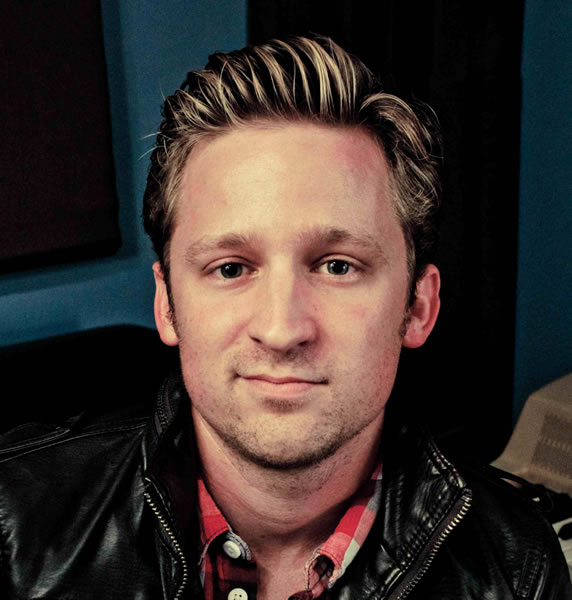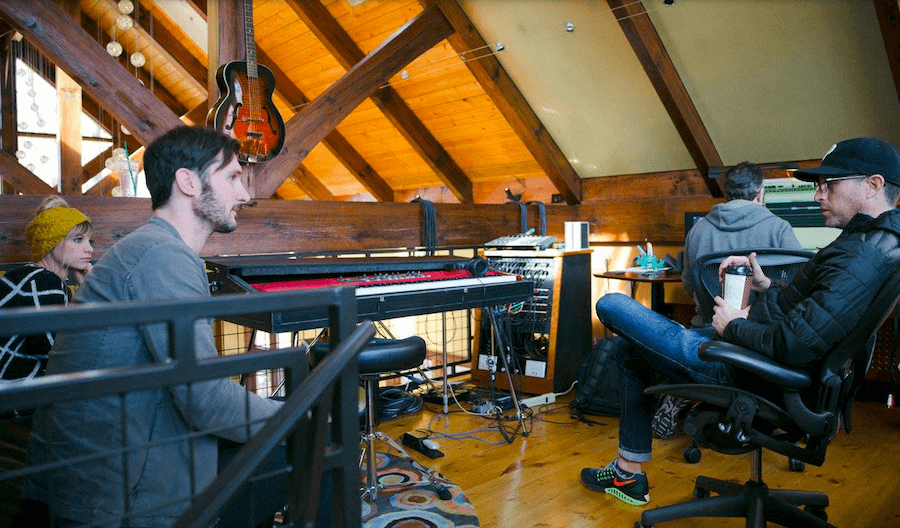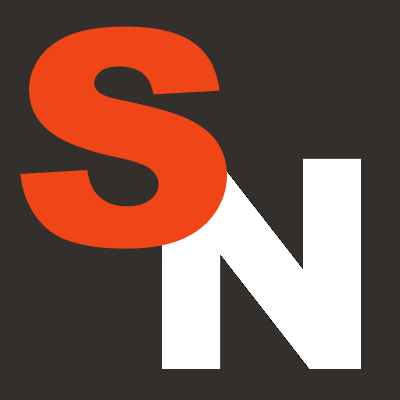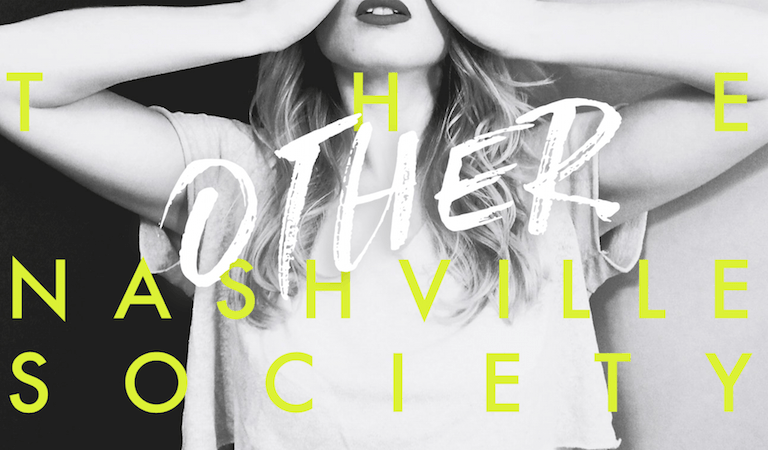Josh Collum is no stranger to sync. His band, Secrets in Stereo, is one of the most licensed independent acts in the world, and he’s also the co-founder of Sorted Noise, a team of creators that hand makes and curates music for picture. We recently chatted to Josh about bespoke composition and sync, how the digital ecosystem is empowering creatives, and why he launched The Other Nashville Society.

Josh Collum
Hey Josh, thanks for chatting with us. How did you get into the music industry in the first place?
I moved to Nashville about 10 years ago to be an artist. My brother, who is a musician and producer, was already here, so it was an easy move for me. I realised it was going to be a tough road as a musician, so I got a job in marketing and split my time between the two. Luckily, I was able to slowly build a career in sync as an artist, and could eventually quit my day job. I’ve now moved from the artist thing to building a sync business with a roster of artists.
Your band, Secrets in Stereo, is one of the most synced indie acts in the world. How did you achieve that level of success?
Not long after I moved to Nashville I quickly realised that the industry was changing and there wasn’t just one path to success. I wasn’t interested in getting in a band and playing to 20 people in the middle of nowhere. I was watching TV and noticed that there were unknown artists being featured on shows, and I thought, “Why can’t that be me?” I didn’t know what a music supervisor was, but I started digging and reaching out to people one by one. It could have gone terribly wrong, but I was able to write an interesting enough email and most importantly, the music didn’t suck. My goal was to get one out of every ten music supervisors to respond, and I was able to do that and start building relationships authentically from there.
You’ve had a lot of success with micro licensing. Was that through Rumblefish?
Yeah. I did some research and found this company. I was probably one of their first artists, and I started getting my music into a lot of Animoto videos wedding photography montages.
You mentioned your success with wedding videos on the CD Baby podcast a few years ago
Yeah. That was a big one for me. Once it hits YouTube it just spreads like wildlife. I also had some success with Twilight fan content. Some Twilight fans had tried to use a song from one of the major labels and it got blocked. Rumblefish had built this tool called AudioSwap and they recommended my song instead, and that’s now got millions of views. So micro licensing was a really big deal for me – those cheques were hundreds of dollars for a while, but eventually they started becoming thousands. It really opened my eyes early on to what micro sync could do.
You wrote an article for Music Business Worldwide in 2015 about the lack of success stories out there on artists in the digital age. Do you think that this conversation is now changing and there’s a more positive outlook?
I wrote that piece because I got tired of all the negative articles. I thought, “When is someone going to write something that actually shows the positive side of this?”, because we were working with only indie artists in sync. A few of them were still at school and making a $1,000 a month on Spotify. When I was in school I had to deliver pizzas to make even half of that. I was really nervous about the reaction to that article, but I was surprised at how much positive feedback I got. 80% of it was people saying, “Thank you, finally someone is saying this – I’ve been thinking this the whole time.” I realised there was already a positive outlook out there, it’s just that it was coming from the indie world. The press focuses on the superstar artists and major label employees, but indie artists and labels/publishers had to embrace new opportunities early on. They had to re-think their business model and they had the agility to do it. They’ve always gotten it, they just weren’t being heard. Now that the majors are starting to see the money the conversation is changing and they’re not barking negativity all the time.
There’s definitely more of a media spotlight now on successful DIY artists and indie companies
Right. And there’s more success stories that you’re able to actually follow all the way back to a streaming service or YouTube or another digital platform. And on the flipside, you’re seeing companies like Spotify invest back into that pipeline. They’re starting to show the love the other way too which I think has to happen as well.
How did Sorted Noise get started? What’s the business model?
My brother, his best friend and I were producing music in Nashville, and I basically badgered them into bringing me on as a partner and chasing down this larger sync play, which became Sorted Noise. The core of what we do really is very simple; it’s licensing music for picture and it’s creating original music for picture. As we’ve grown we’ve created a boutique digital label and publishing arm, both of which are driven by sync. We have around 40 artists and 6 composers on our roster, and we also represent all of their back catalogue. When it works really well we’re creating a song from scratch, licensing that song to something big and then releasing that song on our label. In many ways sync is all about luck and being in the right place at the right time. We wanted to take some of that out and be as agile and strategic as possible.

The Sorted Noise studio
Bespoke composition definitely seems to be more popular in the world of advertising and branding
Yeah, it is, and that’s good and bad in some ways. When people wanted instrumentals, you could crank that out easily in 48 hours, but now they’re asking for something bespoke in the same timeframe. It’s an interesting dilemma. So there’s a bit of an education curve that we go through with brands and ad agencies especially, to remind them that it’s still art and art takes time. You have to get it right or it’s not going to be what you need. We’re definitely seeing more brands wanting larger partnerships with artists, and I would love to see more of that in the future. Music is an afterthought for a lot of brands, but I think that’s beginning to change.
And then you are able to exploit those original compositions again for secondary licensing opportunities
Absolutely. I would say that when we create a song, 70% of the time it gets licensed. But the overwhelming majority of that 70% is not the original thing we created it for. It’s interesting that there’s kind of a DNA that runs through music that works for picture. And that stays true whether it’s the project that you’re creating it for or something that happens two years down the road.
You have a joint publishing venture Alternative Noise, between Scott Cresto’s Music Alternatives and Sorted Noise. How does that work?
We’ve had a deep partnership with Scott Cresto for about five years and our JV was just a natural extension of that. Sync is still going to be the driver in determining who we sign, but with the JV we’ll be looking for artists and writers that can really use sync as a launch pad to do something more. Scott was at Chrysalis for 10 years, and Warner/Chappell before that so he’s a great person to have on board. One of the things that I’ve always had in the back of my mind is that sync can be gasoline on the fire. We’ve always seen artists break from sync, but we’re looking to do it a little more strategically.
When you say more strategically, what do you mean by that?
Well, after an artist or songwriter has had four or five big syncs they suddenly have a certain cachet. So you might be able to get them in a room to write with a major label artist, for example. It’s all about building off of the success that you’ve had in sync to do more.
What’s been your favourite placement so far this year?
I think the coolest one that we’ve done recently was for the TV show This Is Us. The show’s composer had written a song for a really heavy scene. The show is produced by NBCUniversal, so they brought in a ton of Universal artists but they just hadn’t been able to get it right. They reached out to us and we had an artist named Hannah Miller record this really broken down, cool version of the song. When they heard Hannah’s version they stopped the search. After the episode had aired it just blew up and charted on Billboard, Tunefind, etc. That was a really cool experience, because it was kind of that perfect storm.
You also started The Other Nashville Society, a community of non-country music creators and industry professionals. What was the impetus behind that?
I always tell people that there’s two Nashvilles; there’s the big animal and machine that is country music, and then there’s this whole other Nashville that doesn’t touch any of that. There’s artists like Kings of Leon, Miley Cyrus, Jack White and The Black Keys that have all come out of Nashville but aren’t typically associated with it. I travel a lot in this business and I noticed that people would always send me briefs wanting something country because we’re from Nashville. We literally do not work with a single country artist, so I got frustrated and said, “You know what, there needs to be some sort of gathering point for all of the non-country music folks here.” Whether that’s artists, producers, managers, or lawyers – we all run into each other but it’s always very random. I got tired of there not being a focal gathering point.
I kicked around the idea for a while and eventually I got together with artist manager Ally Venable, publishing executive Mark Abramowitz, singer-songwriter Holley Maher and publishing executive Katie Fagan and the five of us co-founded TONS in May. It blew up like we thought it would and we’ve got over 500 members so far. We’re very selective – we hand select every member because we want it keep it a very curated thing. We just did this panel event called TONS Talk with some pop songwriters that people don’t realise are living in Nashville. There’s Jim Jonsin who’s written for Lil Wayne, Beyoncé, T.I., Eminem among others. He moved his whole operation from Miami to Nashville about a year and a half ago. We also had Brett McLaughlin here who went to Belmont University, one of the schools here. He wrote “Fetish” for Selena Gomez and also her new single “Wolves”. We were also joined by Tommy English who has just moved here – he did all of Børns’ first record. All of those writers have moved here in the last few years.
So a lot more songwriters are moving to Nashville specifically?
There’s been a huge influx of people moving here from New York and LA, especially in the last five years or so. Nashville’s gotten this ‘it’ quality thing going on, and a lot of those writers and artists are coming here to do non-country stuff. So that’s a big thing on the creator side. And on the business side, Roc Nation has opened up an office here, all of the major publishers are moving pop and A&R people here. There’s just a lot more infrastructure for non-country stuff here, and that’s really taken off in the last 18/24 months.
We touched on YouTube earlier with micro licensing. It’s often depicted as the enemy of the music industry, what your thoughts are on the whole YouTube debate?
Well, I’m obviously a bit biased as I’ve earned a pretty good living off of YouTube. Having said that, I think YouTube, Google and all of the other big players in the ecosystem have to be more helpful on their end, whether that’s investing in the creative community or giving them more recognition. I think YouTube and Google specifically need to be better at helping identify when a song is being used illegally. Right now it seems that the responsibility really lies with the copyright owner, and that’s not cool. I think it’s improving though – Lyor Cohen’s move to YouTube may have been a bit bumpy so far but it’s obviously going to help. We’re still so early in this transition from old to new media, but I’m optimistic that it will get worked out.
And then there’s the new Facebook ID system
That’s one of my biggest things to watch in 2018, because the viewership numbers on Facebook videos are incredible. I’m really interested to see what that’s going to mean for the industry as they build out their ID system. That could really open up a lot of dollars.
What do you see as the other game changers for the music industry?
Like I said, I think the transition from old to new media is picking up. Every week there are positive stories of numbers going up and companies helping to make sure things are done legally. A a lot of bricks in the wall have started to come together this year. People always ask me, “What can we do?”, and I think the frustrating answer is just relax, because consumer behaviour takes a long time to change. It’s certainly starting to happen and the numbers are beginning to add up.
Sorted Noise is proof that businesses can survive and thrive in the digital age
Exactly, it’s all about your business model. A lot of our systems are still archaic and agreements and contracts are still written in language that needs to be updated. Change is always going to take time, but it’s definitely happening.

sortednoise.com
twitter.com/sortednoise
facebook.com/sortednoise
